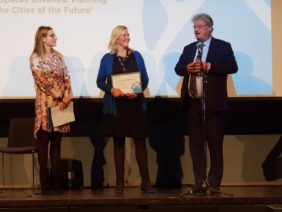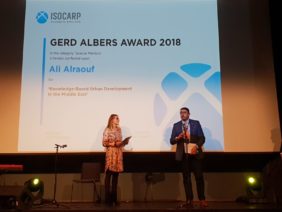
Ana Peric with the winners Han Admiraal and Antonia Cornaro

Ali Alraouf
The Gerd Albers Award (GAA) was established in 1999 in honour of professor Gerd Albers, a co-founder and past president of the Society, who placed a particular emphasis on the task of publishing as a means of elucidating both the current debate and practical achievements in the planning field. This reputable award is bestowed for the best publication (book, book chapter, journal article and/or published project report) of the ISOCARP members.
In 2018, in total twelve GAA entries of high academic standards covering a range of topics of wide professional appeal were submitted – two books, four book chapters and six journal articles:
- Underground Spaces Unveiled: Planning and Creating the Cities of the Future, by Han Admiraal and Antonia Cornaro
- Knowledge-Based Urban Development in the Middle East, by Ali Alraouf
- Photographic comparison: a method for qualitative outdoor thermal perception surveys, by João Cortesão, Fernando Brandão Alves and Kevin Raaphorst
- Urban planning inputs in sustainable condominium housing projects in Ontario, Canada, by Jacob Babarinde
- Towards a Smart Metropolitan Region: A Roadmap for Transforming Bangalore Metropolitan Region, by Amit Chatterjee, Binayak Choudhary, Premjeet Das Gupta and Gaurav Vaidya
- A critical appraisal on Turkey’s neoliberal quest of urban renewal in historic urban landscapes, by Zeynep Gunay
- ‘Conversion’: industrial facilities and territories, by Christian Horn
- Does the role of a bicycle share system in a city change over time? A longitudinal analysis of casual users and long-term subscribers, by Taru Jain, Xinyi Wang, Geoffrey Rose and Marilyn Johnson
- Smart and Sustainable Cities: What Is Smart? – What Is Sustainable?, by Piere Laconte
- Transit-Oriented Development: Planning Tool for Sustainable and Affordable Urban Development, by P. S. Uttarwar
- Towards Sustainable Neighborhoods: Challenges and Opportunities for Neighborhood Planning in Transitional Urban China, by Qi Zhang, Esther Hiu Kwan Yung and Edwin Hon Wan Chan
- Redefining the Smart City: Culture, Metabolism and Governance, by Zaheer Allam and Peter Newman
The jury composed of the Scientific Committee members – Ernst Drewes (South Africa), Eric Huybrechts (France), Awais Piracha (Australia), Benjamin Scheerbarth (Germany) – as well as Ana Peric (Switzerland) as the VP Awards and the jury president, decided on the winners as follows:
GAA ‘Best Book’:
Han ADMIRAAL and Antonia CORNARO, Underground Spaces Unveiled: Planning and Creating the Cities of the Future
Based on authors’ rich experience in developing the potential of the underground, the book represents a major breakthrough in the ‘groundscapes’ research. It exceeds the popular narrative on the underground space: the outcomes are based on a comprehensive overview of both the constraints and possibilities for the underground space use as well as in-depth case studies. The ideas, approaches and instruments illustrating how to deal efficiently with the ‘groundscapes’ and how to increase their potential are precious: not only transport hubs, but also subterranean parks, pedestrian zones, commercial, entertainment and cultural facilities, are some of many examples that clearly revolve around the urban challenges of city expansion, extreme energy consumption, the lack of green areas, and threat for public health. Hence, the book offers invaluable advice to broad audience beyond planning circles interested in creating the cities of the future.
GAA ‘Best article’:
Qi ZHANG, Esther HIU KWAN YUNG and Edwin HON WAN CHAN, Towards Sustainable Neighborhoods: Challenges and Opportunities for Neighborhood Planning in Transitional Urban China
The paper presents the results of comprehensive research on a challenging issue: neighbourhood planning within the highly centralised spatial, social and political context of China. The study follows a sound methodological approach, including the international comparison as a base for exploring the local situation. The current status on the topic is profoundly elaborated, highlighting also the reasons that diminish importance of local response to spatial challenges. The paper provides sound, realistic lessons for the planners and decision-makers who intend to use the instrument of neighborhood planning to achieve sustainable urban development.
GAA ‘Special mention’:
Ali ALRAOUF, Knowledge-Based Urban Development in the Middle East
The book places an emphasis on the knowledge-based development as a concept explored and implemented in Western world, but highly challenging in the geographical scope of the Middle East. By using the examples of various mega knowledge-based projects in the region, the contributors overcome the ICT clusters and knowledge economy as the most popular aspects of the knowledge-based development, and consider the knowledge-governance a tool for promoting democracy, citizens’ initiatives and smart stakeholder collaboration. Such an approach clearly calls for a paradigm shift in the Middle East – from the authoritarian regimes towards the soft infrastructure. Therefore, the book implies a more dynamic development of the knowledge cities in the Middle East as a means to transcend the currently limited view of the region.
Congratulations to the winners and a big thank you to all authors who submitted a book or an article. We look forward to successful GAA submissions the next year, too.